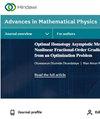Abundant Exact Soliton Solutions of the ( 2 + 1 )-Dimensional Heisenberg Ferromagnetic Spin Chain Equation Based on the Jacobi Elliptic Function Ideas
IF 1.1
4区 物理与天体物理
Q3 PHYSICS, MATHEMATICAL
引用次数: 3
Abstract
The Heisenberg ferromagnetic spin chain equation (HFSCE) is very important in modern magnetism theory. HFSCE expounded the nonlinear long-range ferromagnetic ordering magnetism. Also, it depicts the characteristic of magnetism to many insulating crystals as well as interaction spins. Moreover, the ferromagnetism plays a fundamental role in modern technology and industry and it is principal for many electrical and electromechanical devices such as generators, electric motors, and electromagnets. In this article, the exact solutions of the nonlinear ( 2 + 1 )-dimensional HFSCE are successfully examined by an extended modified version of the Jacobi elliptic expansion method (EMVJEEM). Consequently, much more new Jacobi elliptic traveling wave solutions are found. These new solutions have not yet been reported in the studied models. For the study models, the new solutions are singular solitons not yet observed. Additionally, certain interesting 3D and 2D figures are performed on the obtained solutions. The geometrical representation of the HFSCE provides the dynamical information to explain the physical phenomena. The results will be significant to understand and study the ( 2 + 1 )-dimensional HFSCE. Therefore, further studying EMVJEEM may help researchers to seek for more soliton solutions to other nonlinear differential equations.基于Jacobi椭圆函数思想的(2 + 1)维Heisenberg铁磁自旋链方程的大量精确孤子解
海森堡铁磁自旋链方程(HFSCE)在现代磁学理论中占有重要地位。HFSCE阐述了非线性长程铁磁有序磁性。此外,还描述了许多绝缘晶体的磁性特征以及相互作用自旋。此外,铁磁性在现代技术和工业中起着基础作用,它是许多电气和机电设备(如发电机、电动机和电磁铁)的主要成分。本文用Jacobi椭圆展开法(EMVJEEM)的扩展修正版,成功地检验了非线性(2 + 1)维HFSCE的精确解。从而得到了更多新的雅可比椭圆行波解。这些新的解决方案尚未在研究的模型中报道。对于研究模型,新的解是尚未观测到的奇异孤子。此外,对得到的解进行了一些有趣的3D和2D图形。HFSCE的几何表示提供了解释物理现象的动力学信息。这对理解和研究(2 + 1)维的HFSCE具有重要意义。因此,进一步研究EMVJEEM可以帮助研究人员寻找更多的非线性微分方程的孤子解。
本文章由计算机程序翻译,如有差异,请以英文原文为准。
求助全文
约1分钟内获得全文
求助全文
来源期刊

Advances in Mathematical Physics
数学-应用数学
CiteScore
2.40
自引率
8.30%
发文量
151
审稿时长
>12 weeks
期刊介绍:
Advances in Mathematical Physics publishes papers that seek to understand mathematical basis of physical phenomena, and solve problems in physics via mathematical approaches. The journal welcomes submissions from mathematical physicists, theoretical physicists, and mathematicians alike.
As well as original research, Advances in Mathematical Physics also publishes focused review articles that examine the state of the art, identify emerging trends, and suggest future directions for developing fields.
 求助内容:
求助内容: 应助结果提醒方式:
应助结果提醒方式:


